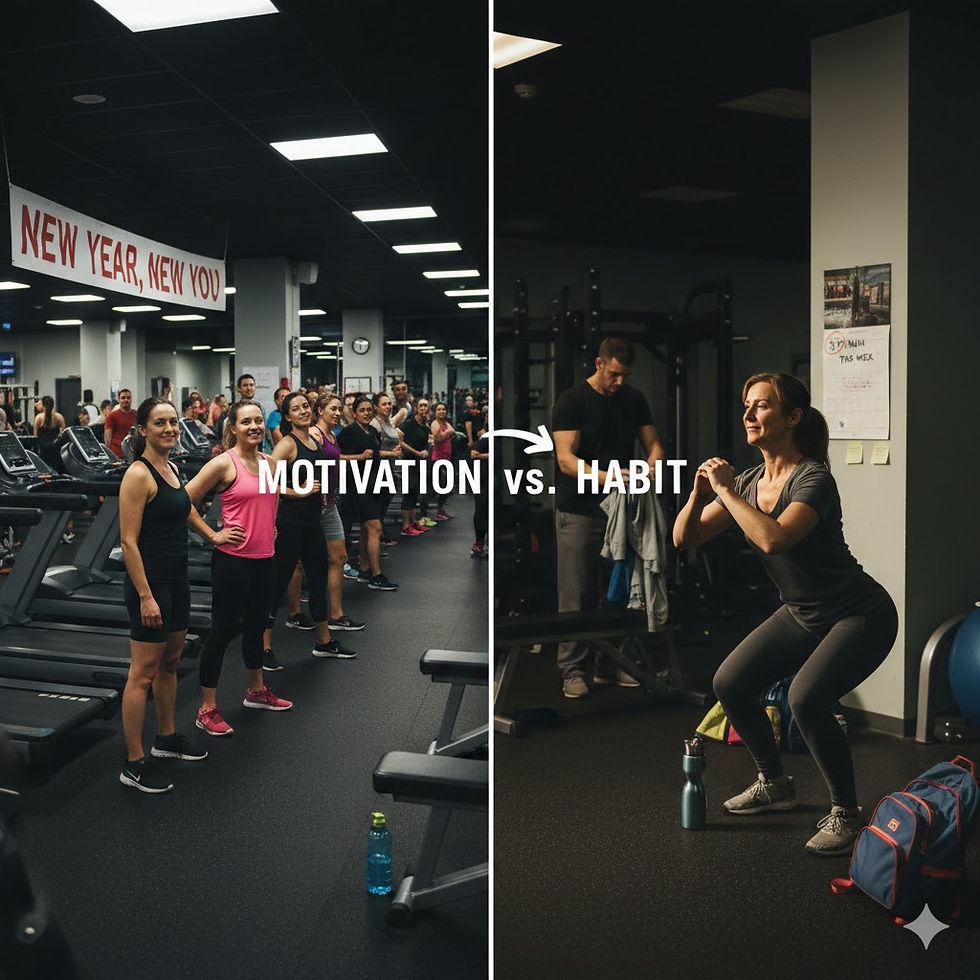Do Cold Plunges Burn Fat? Science or Just Another Wellness Trend?
- ross5156
- Apr 7, 2025
- 3 min read
Updated: May 13, 2025

Cold plunges are having a moment. You’ve probably scrolled past videos of people dipping into wheelie bins of ice water, claiming it’s their secret weapon for fat loss, mental clarity, and superhero-level discipline.
But can cold water actually help you lose fat? Is there solid science behind it—or is this just another flashy fitness fad?
Let’s take a cold, hard look at the facts. 🧊
❄️ What Happens to Your Body During a Cold Plunge?
When you immerse your body in cold water (typically between 10–15°C), it triggers several physiological responses:
Vasoconstriction: Blood vessels narrow to preserve core temperature.
Adrenaline spike: You feel alert, awake, and possibly like a Viking.
Increased metabolic activity: Your body works harder to generate heat, burning calories in the process.
It also activates brown adipose tissue (BAT)—a type of fat that burns energy to generate heat. This “good fat” plays a role in metabolism, especially during cold exposure.
But here's the kicker:The calorie burn is modest. You’re not melting away belly fat in 3 minutes. The effect is real, but small and temporary.
🔬 Science Check: Can Cold Exposure Lead to Fat Loss?
The science says:
Short-term calorie burn: Yes, but comparable to a cup of hot tea or a brisk walk.
Long-term fat loss: Not really, unless combined with solid nutrition, exercise, and recovery habits.
Mental resilience and mood benefits: Strong anecdotal and early scientific support.
One study published in The Journal of Clinical Endocrinology & Metabolism found that repeated cold exposure may slightly boost resting energy expenditure, but it’s no substitute for consistent movement and a smart eating plan.
⚠️ Cold plunges are not a replacement for training or nutrition. Think of them as a supplement—not the strategy.
🏋️ Cold Water vs. Exercise: What’s More Effective for Fat Loss?
Factor | Cold Plunge | Exercise |
Calorie Burn | Mild & short-lived | Moderate to high |
Muscle Growth | ❌ | ✅ |
Long-term Impact | Minimal | Major |
Habit-Building | Difficult to sustain | Sustainable with support |
💡 If fat loss is your goal: Stick to training and a balanced nutrition plan. Cold plunges can complement your routine, but they won’t carry the load.
💭 Why Cold Plunges Feel So Good
Even if the fat-burning hype is overblown, cold water immersion does come with real upsides:
Improved mood & focus
Reduced inflammation
Better recovery perception
Mental toughness
This isn’t just fluff—there’s research backing some of these effects, especially for mental health and inflammation.
❓ Cold Plunge FAQs
Do cold plunges help with fat loss?Slightly—but not enough to replace diet or exercise.
How often should I plunge?2–4 times per week is typical. Start slow and listen to your body.
Are cold showers as effective as ice baths?Cold showers offer similar benefits but are less intense.
Is it safe?Generally yes—but consult your doctor if you’re pregnant, have heart conditions, or blood pressure issues.
💡 Real Talk: Will a Cold Plunge Change Your Life?
Cold plunges won’t magically shred fat. But they might:
Help you build discipline.
Wake up your nervous system.
Inspire better habits elsewhere in your life.
Sometimes, doing something hard kickstarts momentum in ways we don’t expect.
“It’s not the cold that burns fat—it’s the mindset shift that comes from doing something hard… and doing it consistently.”
✅ Want a Fat Loss Strategy That Actually Works?
If you’re tired of chasing hacks and ready to make real, lasting progress:
🧊 Bottom Line
Cold plunges are great for mental resilience, wellness, and that adrenaline rush that makes you feel alive. But if your main goal is fat loss, you’ll need more than an ice bath.
Consistency, training, and smart nutrition win every time.
That said—go ahead, jump in the cold water. Just don’t expect it to do the heavy lifting for you.
About the Authors
Ross and Stephanie O’Loughlin are certified strength coaches and EQF Level 4 personal trainers based in Wexford/Wicklow, Ireland. Through their coaching brand, The FitBoss, they help busy men and women reclaim energy, build strength, and feel confident—without fads or fluff.
📍 In-person & Online Coaching Available📧 Learn more or book a consult at thefitboss.ie
References (Harvard Style)
Cypess, A.M. et al., 2012. Cold but not sympathomimetics activates human brown adipose tissue in vivo. Proceedings of the National Academy of Sciences, 109(25), pp.10001–10005.
van der Lans, A.A.J.J. et al., 2013. Cold acclimation recruits human brown fat and increases nonshivering thermogenesis. The Journal of Clinical Investigation, 123(8), pp.3395–3403.
Shevchuk, N.A., 2008. Adapted cold shower as a potential treatment for depression. Medical Hypotheses, 70(5), pp.995–1001.



Comments